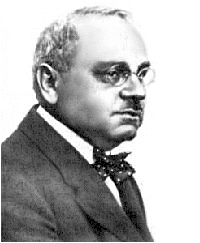|
Neo-Adlerian
Neo-Adlerian psychologists are those working in the tradition of, or influenced by Alfred Adler, an early associate of, and dissident from the ideas of, Sigmund Freud. Education Neo-Adlerian ideas have been identified in the field of education, associated particularly with the work of Rudolf Dreikurs. The Neo-Adlerian classroom model stresses the importance of the student's search for feelings of belonging. Neo-Freudians Fritz Wittels used the term 'Neo-Adlerian' to refer derogatively to the Neo-Freudianism, Neo-Freudians, due to their emphasis on the social aspects of psychology. Heinz Ansbacher however sought to capture the Neo-Freudians ''as'' neo-Adlerians, to promote Adler's influence. Henri Ellenberger would later adjudge that what he called the neo-psychoanalysts like Karen Horney and Erich Fromm would indeed more accurately be known as neo-Adlerians. Transactional Analysis has also been termed a neo-Adlerian school - Eric Berne himself acknowledging that "of all those who ... [...More Info...] [...Related Items...] OR: [Wikipedia] [Google] [Baidu] |
Alfred Adler
Alfred Adler ( , ; 7 February 1870 – 28 May 1937) was an Austrian medical doctor, psychotherapist, and founder of the school of individual psychology. His emphasis on the importance of feelings of belonging, family constellation and birth order set him apart from Freud and other members of the Vienna Circle. He proposed that contributing to others (Social Interest or ) was how the individual feels a sense of worth and belonging in the family and society. His earlier work focused on inferiority, the inferiority complex, an isolating element which plays a key role in personality development. Alfred Adler considered a human being as an individual whole, and therefore he called his psychology "Individual Psychology" (Orgler 1976). Adler was the first to emphasize the importance of the social element in the re-adjustment process of the individual and to carry psychiatry into the community. A ''Review of General Psychology'' survey, published in 2002, ranked Adler as the 67th most e ... [...More Info...] [...Related Items...] OR: [Wikipedia] [Google] [Baidu] |
Adlerian Psychology
Individual psychology (german: Individualpsychologie) is a psychological method or science founded by the Viennese psychiatrist Alfred Adler. The English edition of Adler's work on the subject (1925) is a collection of papers and lectures given mainly between 1912 and 1914. The papers cover the whole range of human psychology in a single survey, and were intended to mirror the indivisible unity of the personality. In developing the concept of individual psychology, Adler broke away from the psychoanalytic school of Sigmund Freud. While Adler initially called his work "free psychoanalysis", he later rejected the label of " psychoanalyst". His method, involving a holistic approach to the study of character, has been extremely influential in later 20th century counselling and psychiatric strategies. The term "individual psychology" does not mean to focus on the individual. Adler said one must take into account the patient's whole environment, including the people the patient associa ... [...More Info...] [...Related Items...] OR: [Wikipedia] [Google] [Baidu] |
Classical Adlerian Psychology
Individual psychology (german: Individualpsychologie) is a psychological method or science founded by the Viennese psychiatrist Alfred Adler. The English edition of Adler's work on the subject (1925) is a collection of papers and lectures given mainly between 1912 and 1914. The papers cover the whole range of human psychology in a single survey, and were intended to mirror the indivisible unity of the personality. In developing the concept of individual psychology, Adler broke away from the psychoanalytic school of Sigmund Freud. While Adler initially called his work "free psychoanalysis", he later rejected the label of "psychoanalyst". His method, involving a holistic approach to the study of character, has been extremely influential in later 20th century counselling and psychiatric strategies. The term "individual psychology" does not mean to focus on the individual. Adler said one must take into account the patient's whole environment, including the people the patient associate ... [...More Info...] [...Related Items...] OR: [Wikipedia] [Google] [Baidu] |
Adlerian
Individual psychology (german: Individualpsychologie) is a psychological method or science founded by the Viennese psychiatrist Alfred Adler. The English edition of Adler's work on the subject (1925) is a collection of papers and lectures given mainly between 1912 and 1914. The papers cover the whole range of human psychology in a single survey, and were intended to mirror the indivisible unity of the personality. In developing the concept of individual psychology, Adler broke away from the psychoanalytic school of Sigmund Freud. While Adler initially called his work "free psychoanalysis", he later rejected the label of " psychoanalyst". His method, involving a holistic approach to the study of character, has been extremely influential in later 20th century counselling and psychiatric strategies. The term "individual psychology" does not mean to focus on the individual. Adler said one must take into account the patient's whole environment, including the people the patient associa ... [...More Info...] [...Related Items...] OR: [Wikipedia] [Google] [Baidu] |
Harry Stack Sullivan
Herbert "Harry" Stack Sullivan (February 21, 1892, Norwich, New York – January 14, 1949, Paris, France) was an American Neo-Freudian psychiatrist and psychoanalyst who held that "personality can never be isolated from the complex interpersonal relationships in which person lives" and that " e field of psychiatry is the field of interpersonal relations under any and all circumstances in which uchrelations exist". Having studied therapists Sigmund Freud, Adolf Meyer, and William Alanson White, he devoted years of clinical and research work to helping people with psychotic illness. Early life Sullivan was a child of Irish immigrants and grew up in the then anti-Catholic town of Norwich, New York, resulting in a social isolation which may have inspired his later interest in psychiatry. He attended the Smyrna Union School, then spent two years at Cornell University from 1909, receiving his medical degree in Chicago College of Medicine and Surgery in 1917. Work Along with Clara Tho ... [...More Info...] [...Related Items...] OR: [Wikipedia] [Google] [Baidu] |
School Discipline
School discipline relates to actions taken by teachers or school organizations toward students when their behavior disrupts the ongoing educational activity or breaks a rule created by the school. Discipline can guide the children's behavior or set limits to help them learn to take better care of themselves, other people and the world around them. School systems set rules, and if students break these rules they are subject to discipline. These rules may, for example, define the expected standards of school uniform, punctuality, social conduct, and work ethic. The term "discipline" is applied to the punishment that is the consequence of breaking the rules. The aim of discipline is to set limits restricting certain behaviors or attitudes that are seen as harmful or against school policies, educational norms, school traditions, etc. The focus of discipline is shifting and alternative approaches are emerging due to notably high dropout rates, disproportionate punishment upon minori ... [...More Info...] [...Related Items...] OR: [Wikipedia] [Google] [Baidu] |
Psychological Games
Playing mind games (also power games or head games) is the largely conscious struggle for psychological one-upmanship, often employing passive–aggressive behavior to specifically demoralize or dis-empower the thinking subject, making the aggressor look superior. It also describes the unconscious games played by people engaged in ulterior transactions of which they are not fully aware, and which transactional analysis considers to form a central element of social life all over the world. The first known use of the term "mind game" dates from 1963, and "head game" from 1977. Conscious one-upmanship In intimate relationships, mind games can be used to undermine one partner's belief in the validity of their own perceptions. Personal experience may be denied and driven from memory, and such abusive mind games may extend to the denial of the victim's reality, social undermining, and downplaying the importance of the other partner's concerns or perceptions. Both sexes have equal ... [...More Info...] [...Related Items...] OR: [Wikipedia] [Google] [Baidu] |
Thomas Anthony Harris
Thomas Anthony Harris (April 18, 1910 – May 4, 1995) was an American psychiatrist and author who became famous for his self-help manual '' I'm OK, You're OK'' (1967).THOMAS A. HARRIS Psychiatrist and Author obituary in , May 7, 1995 The book was a bestseller and its name became a during the 1970s. Career Harris received his Bachelor of Science degree from the |
Eric Berne
Eric Berne (May 10, 1910 – July 15, 1970) was a Canadian-born psychiatrist who created the theory of transactional analysis as a way of explaining human behavior. Berne's theory of transactional analysis was based on the ideas of Freud but was distinctly different. Freudian psychotherapists focused on talk therapy as a way of gaining insight to their patient's personalities. Berne believed that insight could be better discovered by analyzing patients’ social transactions. Background and education (1927–1938) Eric Berne was born on May 10, 1910, in Montreal, Quebec, Canada, as Eric Lennard Bernstein. He was the son of David Hillel Bernstein, MD, a general practitioner, and Sarah Gordon Bernstein, a professional writer and editor. His only sibling, his sister Grace, was born five years later. The family immigrated to Canada from Poland and Russia. Both parents graduated from McGill University in Montreal. Eric was close to his father and spoke fondly of how he accompani ... [...More Info...] [...Related Items...] OR: [Wikipedia] [Google] [Baidu] |
Sigmund Freud
Sigmund Freud ( , ; born Sigismund Schlomo Freud; 6 May 1856 – 23 September 1939) was an Austrian neurologist and the founder of psychoanalysis, a clinical method for evaluating and treating psychopathology, pathologies explained as originating in conflicts in the Psyche (psychology), psyche, through dialogue between a patient and a psychoanalyst. Freud was born to Galician Jews, Galician Jewish parents in the Moravian town of Příbor, Freiberg, in the Austrian Empire. He qualified as a doctor of medicine in 1881 at the University of Vienna. Upon completing his habilitation in 1885, he was appointed a docent in neuropathology and became an affiliated professor in 1902. Freud lived and worked in Vienna, having set up his clinical practice there in 1886. In 1938, Freud left Austria to escape Nazi persecution. He died in exile in the United Kingdom in 1939. In founding psychoanalysis, Freud developed therapeutic techniques such as the use of free association (psychology), free a ... [...More Info...] [...Related Items...] OR: [Wikipedia] [Google] [Baidu] |
Transactional Analysis
Transactional Analysis (TA) is a psychoanalytic theory and method of therapy wherein social interactions (or “transactions”) are analyzed to determine the ego state of the communicator (whether parent-like, childlike, or adult-like) as a basis for understanding behavior. In transactional analysis, the communicator is taught to alter the ego state as a way to solve emotional problems. The method deviates from Freudian psychoanalysis which focuses on increasing awareness of the contents of subconsciously held ideas. Eric Berne developed the concept and paradigm of transactional analysis in the late 1950s. History Eric Berne presented Transactional Analysis to the world as a phenomenological approach, supplementing Freud's philosophical construct with observable data. His theory built on the science of Wilder Penfield and René Spitz along with the neo-psychoanalytic thought of people such as Paul Federn, Edoardo Weiss, and Erik Erikson. By moving to an interpersonal moti ... [...More Info...] [...Related Items...] OR: [Wikipedia] [Google] [Baidu] |


